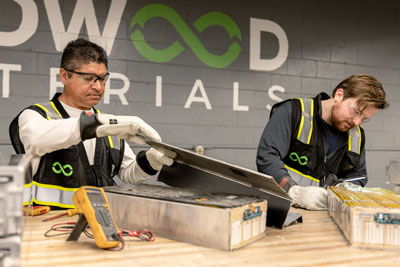The agreement will extract material from batteries from vehicles at the end of their lives for use in manufacturing new batteries.
Toyota Motor North America (TMNA) and Redwood Materials announced an expanded recycling agreement for batteries used in Toyota's electrified vehicles that have reached the end of their life. The plan also includes an agreement for Toyota to source Cathode Active Material (CAM) and Anode copper foil from Redwood's recycling activities for Toyota's future, new automotive battery production.
The agreement builds on the collaboration with Redwood announced last year for battery collection and recycling of Toyota's hybrid and battery EV batteries.
"Working with Redwood Materials, we are creating a circular supply chain to optimize logistics, expand refining and ensure that the valuable metals recovered can be reintroduced into our future vehicles," said Christopher Yang, group vice president, business development, Toyota Motor North America. "Accelerating our recycling efforts and domestic component procurement gets us closer to our ultimate goal of creating a closed-loop battery ecosystem that will become increasingly important as we add more vehicles with batteries to roads across North America."
"Today, in collaboration with Redwood Materials, Toyota is making a decisive move toward a sustainable future," said Cal Lankton, Redwood Materials' chief commercial officer. "They're not only working to ensure responsible end-of-life management for their electric vehicles but also planning to build their next generation of EVs, in part, by using sustainable and domestically manufactured battery components."
Toyota's automotive battery recycling needs are expected to grow substantially in the coming years as more of its electrified vehicles, such as first-generation Prius models introduced more than 20 years ago, reach the end of their lifecycle.
With a large amount of Toyota's retiring fleet of electrified vehicles being in California, Redwood's Nevada recycling facility will support Toyota's North American supply chain, which will improve sustainability, and help to enhance operational improvements across the TMNA enterprise for a closed-loop battery ecosystem---forecast to include the recycling, remanufacturing and repurposing of the nearly 5 million operating units, building toward Toyota's ultimate goals of carbon neutrality for its global operations by 2035 and carbon neutrality for its vehicles by 2050.
Toyota has agreed to develop a closed-loop framework that also includes plans to procure CAM and copper foil from Redwood as part of a long-term agreement.
Based on the parameters of the agreement, CAM recovered and produced from Redwood's recycling activities are expected to feed recycled material into future new battery production at Toyota Battery Manufacturing, North Carolina (TBMNC), which should help increase the focus and relevance of domestic supply chains versus the extensive, carbon-intensive current supply chain of procuring outside of the U.S. Toyota plans to bring its nearly $14 billion TBMNC automotive battery manufacturing facility online in 2025.
"Toyota Battery Manufacturing North Carolina's start of production is right around the corner, and we're thrilled to be procuring critical battery components and materials to filter into our battery ecosystem," said Sean Suggs, TBMNC president. "We'll continue to work toward the sourcing and recycling of battery materials here in the United States to maximize these precious resources and reduce our carbon footprint in the process."
Redwood is making major investments to scale their technology and facilities to supply U.S. battery cell manufacturers and automakers with strategic battery materials produced domestically, for the first time. Redwood continues to expand its Northern Nevada facility and will break ground on its second Battery Materials Campus, outside Charleston, SC, later this year. Both of Redwood's campuses will recycle, refine and manufacture battery materials, aiming to scale production of components to 100 GWh annually.
Based on this agreement, Redwood will provide materials that include a minimum of 20% recycled nickel, 20% recycled lithium and 50% recycled cobalt in its CAM and targeting recycled copper in its anode copper foil.










Abby Andrews